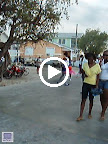42 15.92 N 073 48.03 W
We have entered the zone of upstate New York that we call home. We lived for many years near Syracuse to the West, and Schenectady due North, and Burlington Northeast of here. The landscape is so beautiful that it takes my breath away. Is that an objective judgment or a homeland bias? I can't say for sure. What I can say is that the Hudson Valley, and the Mohawk Valley and the Champlain Valley are all very similar to each other. I can also say that countless travelers and painters have also remarked on the unique beauty of this region.
At the moment we are at 42 degrees North. From this point on the river we have a spectacular view of the Catskill Mountains. They are every bit as pretty as the better known Adirondack Mountains, and Green Mountains and Berkshire mountains, all in this region. The northernmost mountain I see seems to have a big flat area on top. I bet that it is the site of the Blenheim-Gilboa pumped storage power plant. That plant is one of the most beautiful, and most important and most environmentally beneficial power project built any time in any country. Forgive me. As a power engineer, I can't help but notice the power facilities in this neighborhood.
This day, near the end of May, the air is filled with floating wisps of cottony fluff. They are too big to be pollen. They come, I think, from one of the species of Maple. There is so much in the air, it looks like a snow flurry. Also typical of this time of year, the weather is a bit unsettled. We just finished three days of cold, fog and rain. Today is sunny, dry and delightful. Tomorrow it will be blustery with winds at 15 knots gusting to 35 (that's an exceptionally wide range of speeds).
But the most beautiful part of all are the myriad shades of green. Like Ireland, upstate New York is blessed with fields and forests that are verdantly green in late spring. People come from all over the world to see it. My father once met a retired cowboy who hitch-hiked all the way here from the outback of Australia. He said that before dying he wanted to experience with his own eyes the magical greens described in the novels by James Fenimore Cooper that the cowboy had read as a child. I can't match Cooper's writing skills in trying to describe the greens in words.
Out plan is this. Tonight we anchor year Athens, NY. Tomorrow we meet with our friends Fred and Mary for a day sail on the river. Tomorrow night we prepare to take the mast down. Monday, we unstep the mast in Catskill. By Tuesday night we'll be in Waterford, at the junction of the Erie and Champlain Canals. We are a whole week ahead of our planned arrival.
On the banks of the river are some really beautiful homes. They run the whole range from modern to ancient, from the estates of billionaires to one spot that I recognize as a definite hobo colony. I note that this year the hobos have upgraded from a cardboard and wooden shack to a nylon camping tent. As we passed they were sitting in front of their tent poking a camp fire with sticks. They appeared to be very content.
Actually, it appears that the hobos live better than the rich. The homes of the rich are high on the hills and over the years the trees grow tall and block their view of the river. The hobos camp 15 feet from the shore. The rich people are never home and their beautiful houses appear to be unoccupied almost all the time. This is the 5th time we've been up or down the Hudson, and this is the 5th time I've seen the hobos there enjoying their waterfront site.
Even the sounds are beautiful to our ears; and this is definitely a biased opinion. On the Hudson w$e have freight trains on the west bank and passenger trains on the right bank. All day and all night they blast their oh-so-loud horns at each road crossing. Libby and I lived so many years in so many places, all near railroad tracks, that they sound completely natural and beautiful to us. Even in Sweden where the rails were welded and the engines electric, the sounds were much different but still beautiful to us. It may sound strange to you, but we love the sound of trains as much as the sound of mourning doves calling in the early morning.











